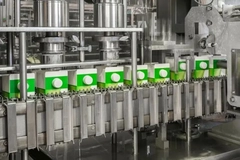Key takeaways
- Oji is investing ¥16 billion (US$103.88 million) to build a liquid packaging carton plant in Dong Nai Province, Vietnam, set to begin operations in March 2028.
- The project supports Oji’s Medium-Term Management Plan 2027, focusing on sustainable packaging and recycling systems for hard-to-recycle liquid cartons.
- Through its Italian subsidiary, IPI, Oji is strengthening its global packaging footprint alongside Southeast Asia.

Japanese paper packaging company Oji has announced the construction of a liquid packaging carton plant in Dong Nai Province, southern Vietnam. The facility will cover a 57,000 square meter site at Amata Long Thanh Industrial Park.
The facility’s commercial operations are scheduled to begin in March 2028, with total investment expected to reach ¥16 billion (US$103.88 million).
“By establishing a new plant in Vietnam, we aim to further strengthen our presence and expand reach in the rapidly growing markets in Southeast Asia and neighboring regions,” Oji says.
Accelerating liquid packaging carton recycling
Oji is also expanding its sales to Europe, Africa, and Latin America through IPI, an Italian manufacturing and sales company it acquired in May 2023.

Liquid packaging cartons can be challenging to recycle. Oji notes that for this reason, it is aiming to establish a new system for the collection and recycling of the packaging.
The company says it offers “smart industry at scale” with its technologies transforming industrial performance and further advancing the material recycling initiatives in Southeast Asia.
The project is aligned with Oji’s Medium-Term Management Plan 2027, announced in May 2025, which aims to reshape the company’s business portfolio by prioritizing sustainable packaging solutions, according to the company.
Tetra Pak also expanded its presence in Vietnam earlier this year, adding a second packaging material production line to its Binh Duong facility and boosting annual production from 12 billion to 30 billion F&B packages.
Moreover, Tetra Pak told Packaging Insights that it continues to use beverage cartons with a layer of aluminium to ensure the product is shelf-stable.












